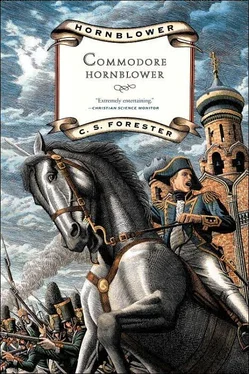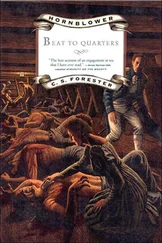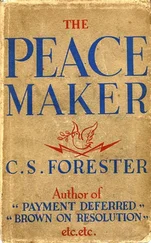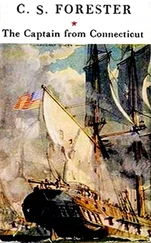Essen was fidgeting in his saddle beside them while this conversation was going on in Spanish; he clearly knew no word of that language and was restless in consequence—Hornblower found it gratifying, for during the past few months he had had to be an uncomprehending listener to so many conversations in Russian and German. This was some slight revenge.
“Has he told you about conditions in Bonaparte’s army?” asked Essen. “Have you heard about the hunger and the disease?”
“Not yet,” said Hornblower.
The story came out rapidly, staccato, drawn from the Conde’s lips by explosive promptings from Essen. Bonaparte’s army had been dying on its feet long before it reached Moscow; hunger and disease had thinned its ranks as Bonaparte hurried it by forced marches across the desolated plains.
“The horses are nearly all dead already. There was only green rye to give them,” said the Conde.
If the horses were dead it would be impossible to drag supplies in to the main body of the army; it would have to scatter or starve, and as long as the Russians had any sort of army in existence it would be impossible for the main body to scatter. As long as Alexander’s nerve held, as long as he maintained the struggle, there was still hope. It began to seem certain that Bonaparte’s army in Moscow had spent its strength, and the only way in which the French could bring fresh pressure upon Alexander would be by advancing upon St. Petersburg with the army here before Riga. That made it more imperative still to hold on here. Hornblower felt considerable doubt as to Alexander’s constancy if he were to lose both his capitals.
The wretched Spanish infantry had been standing presenting arms during all this long conversation, and Hornblower felt uncomfortable about them. He let his attention wander to them obviously, recalling the Conde to a sense of his duty. The Conde gave an order to his staff, and the colonels repeated it; the regiments ordered arms awkwardly and then stood easy, the latter to the manner born.
“His Excellency tells me,” said the Conde, “that you have recently served in Spain, sir. What is the news of my country?”
It was not easy to give a thumbnail sketch of the complicated history of the Peninsula for the last four years, to a Spaniard who had been cut off from all news during that time. Hornblower did his best, glossing over the innumerable Spanish defeats, laying stress on the devotion and efficiency of the guerrilleros, and ending on a hopeful note as he told of Wellington’s recent capture of Madrid. The Spanish staff pressed more and more closely round him as he spoke. For four long years, ever since the Spanish people had declared their will, ceasing to be subservient allies and becoming the most bitter enemies of the Empire, Bonaparte had seen to it that these Spanish troops of his, three thousand miles from home, had received not a single word which might tell them of the real situation in Spain. They had had only the lying Imperial bulletins on which to base their vague theories. It was a strange experience to talk to these exiles; Hornblower felt a curious sensation, as if there were an actual movement inside his brain, as he remembered the conditions in which he himself had learned of the Spanish change of front. That had been on the deck of the Lydia, in the uncharted tropical Pacific. For a few seconds his brain was a battleground of memories. The blue and gold of the Pacific, the heat and the storms and the fighting there, el Supremo and the Governor of Panama—he had to tear himself away from them to bring himself back to this parade ground on the shores of the Baltic.
An orderly officer was galloping madly towards them, the dust flying from beneath the ringing hoofs of his charger. He reined up before Essen with a perfunctory salute, the words of his message pouring from his lips before his hand had left his forehead. A word from the Governor sent him flying back whence he came, and Essen turned to Hornblower.
“The enemy is massing in his trenches,” he said. “They are about to assault Daugavgriva.”
Essen began blaring orders to his staff; horses wheeled and pranced as spurs were struck into their sides and the cruel bits dragged their heads round. In a moment half a dozen officers were galloping in different directions with the messages flung at them.
“I’m going there,” said Essen.
“I shall come too,” said Hornblower.
Hornblower found it hard to stay in the saddle as his excited horse swung round beside the Governor’s; he had to resettle himself, his hand on the pommel, and regain his lost stirrup as they clattered along. Essen turned his head with another order shouted to one of the few remaining orderlies accompanying them, and then spurred his horse yet again; as the brute sprang forward with increased speed the low muttering of the bombardment increased in intensity. They clattered through the streets of Riga, and the timber road-bed of the boat bridge roared under their horses’ hoofs. The sweat was running from Hornblower’s face in the clear autumn sunshine, his sword leaped against his thigh, and time and again his cocked hat rode precariously up his forehead and was only saved by a hurried grab at the last moment. Hornblower was conscious of the swirling water of the Dwina as they crossed the bridge, and then on his right land as they galloped along the quays. The roar of the bombardment grew louder and louder, and then suddenly died away.
“It is the moment of the assault!” bellowed Essen, bending his clumsy body forward in an effort to get more speed out of his labouring horse.
Now they were in the village itself, among the ruins of the cottages, and here they met broken troops, stumbling back pell-mell, blue uniforms grey with dust, with cursing officers trying to rally them, and beating the stupefied men with the flats of their swords. Essen’s voice blared out again, like a tuneless trumpet; he was waving his sword over his head and spurring forward into the press. At the sight of him the men began to rally, turning back to face the enemy, and instinctively closing together into line.
Down through the ruins came a disordered column of the enemy—it must have come up over the breach like a whirlwind. By now it was more of a mob than a column, officers capering at the head of their men, waving their hats and swords. A standard waved over them. The appearance of a formed line caused a momentary hesitation, and ragged firing broke out on both sides; Hornblower saw one of the capering officers fall dead as he called to his men to come on. He looked over at Essen, but he was still towering high in the smoke. Hornblower wheeled his horse towards the flank; his mind was working with the ecstatic speed of excitement, bullets were singing by him, and he knew that this was the crisis of the assault. Halt an attacking column for one moment, and then any trifle might turn the scale, and it would go back as fast as it had advanced. He reached the door of the church just as a flood of men came pouring out of it—the garrison of the building hastening to make good their retreat before they should be cut off and isolated. Hornblower tore his sword from its sheath, miraculously retaining his seat in the saddle.
“Come on!” he yelled, waving the weapon.
They did not understand his words, as they blinked at this vision in blue and gold before them, but anyone could understand his gestures. At the back of the group Hornblower caught a momentary glimpse of Clausewitz and Diebitch, who should have taken command here, but there was no time for argument, and racing through Hornblower’s brain went the conviction at the same time that although they might be scientific soldiers they would be useless in a physical rough-and-tumble like this.
“Come on!” yelled Hornblower again, pointing with his sword at the flank of the assaulting column.
Читать дальше












